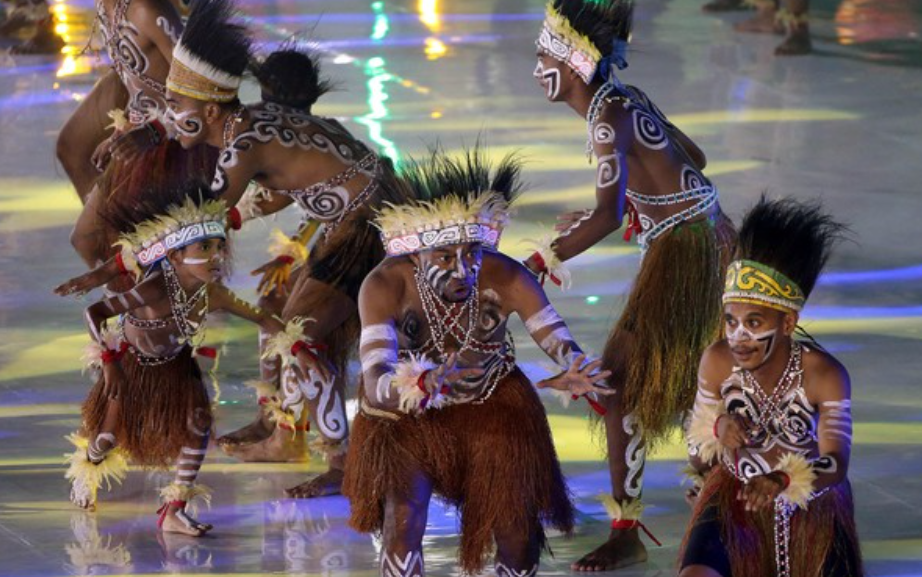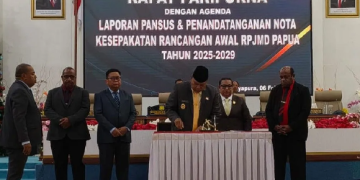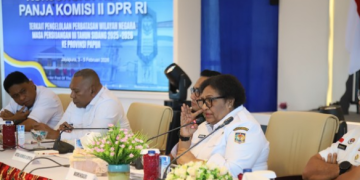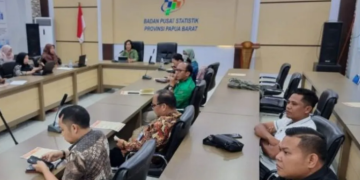PapuaAround.com – In the diverse cultural tapestry of Indonesia, Papua stands out with its vibrant and distinct traditional music. The island’s musical heritage is characterized by a variety of songs that not only entertain but also convey important aspects of Papuan culture and history. This article highlights ten notable traditional songs from Papua, offering a glimpse into the island’s rich cultural landscape.
- “Yamko Rambe Yamko” One of the most renowned traditional songs from Papua is “Yamko Rambe Yamko.” This song originates from the Biak people and is often performed during ceremonial events. The song’s lively rhythm and repetitive chorus make it a favorite among locals. It reflects the communal spirit of Papuan society and is used to celebrate various cultural milestones.
- “Sajojo” “Sajojo” is a popular traditional song from the southern region of Papua. Known for its upbeat tempo and catchy melody, this song is frequently performed during festivities and traditional dances. The lyrics of “Sajojo” celebrate the natural beauty and cultural richness of Papua, making it a key element in the island’s musical heritage.
- “Kekek Sombang” Originating from the Asmat region, “Kekek Sombang” is a traditional song that accompanies ceremonial dances. The song’s rhythmic beats and unique vocal style are integral to Asmat cultural practices. It is often performed during important ceremonies, including rites of passage and community celebrations.
- “Mambor” “Mambor” is a traditional song from the Dani people, known for its distinctive use of traditional instruments such as the fife and drum. The song’s haunting melody and intricate rhythms are used to tell stories of historical and mythical events. It is a staple in Dani cultural events and is cherished for its ability to convey deep cultural narratives.
- “Eliya” The song “Eliya” is a traditional melody from the Lani tribe. It is performed during agricultural festivals and is known for its harmonious blend of voices and traditional instruments. “Eliya” serves as a celebration of the harvest and is an essential part of the tribe’s cultural practices.
- “Arumba” Hailing from the coastal areas of Papua, “Arumba” is a traditional song often performed by women during community gatherings. The song features a rhythmic clapping and singing pattern that reflects the daily life and social interactions of the Papuan people. It is a vital part of the cultural expression in coastal communities.
- “Tari Taro” “Tari Taro” is a traditional Papuan song that accompanies dance performances. Originating from the highlands, the song’s energetic beat and spirited lyrics are used to narrate stories of local heroes and legends. It is performed during festivals and traditional ceremonies, showcasing the rich oral tradition of the Papuan highlands.
- “Nani Nani” This song from the Kanum people is characterized by its repetitive and soothing melody. “Nani Nani” is often used in rituals and healing ceremonies, reflecting the spiritual and mystical aspects of Papuan culture. The song’s calming effect is believed to aid in spiritual healing and connection with the divine.
- “Baliem Valley Song” The “Baliem Valley Song” is a traditional melody from the Dani people, associated with the Baliem Valley region. It is known for its traditional chanting and the use of bamboo flutes. The song plays a crucial role in community gatherings and cultural festivals, celebrating the traditions of the Dani people.
- “Korowai Song” From the Korowai tribe comes a song that is integral to their cultural identity. The “Korowai Song” is performed during rites of passage and communal events. Its intricate rhythms and vocal patterns reflect the tribe’s deep connection to their environment and ancestral heritage.
Each of these traditional songs from Papua not only provides insight into the island’s cultural practices but also serves as a testament to the rich musical heritage that continues to thrive in Papua. Through their rhythms and melodies, these songs preserve the stories, traditions, and identities of Papuan communities, offering a valuable connection to the past and a vibrant expression of cultural pride.
Read also: Papeda! A Traditional Dish Reflecting the Local Wisdom of Papua and Maluku







